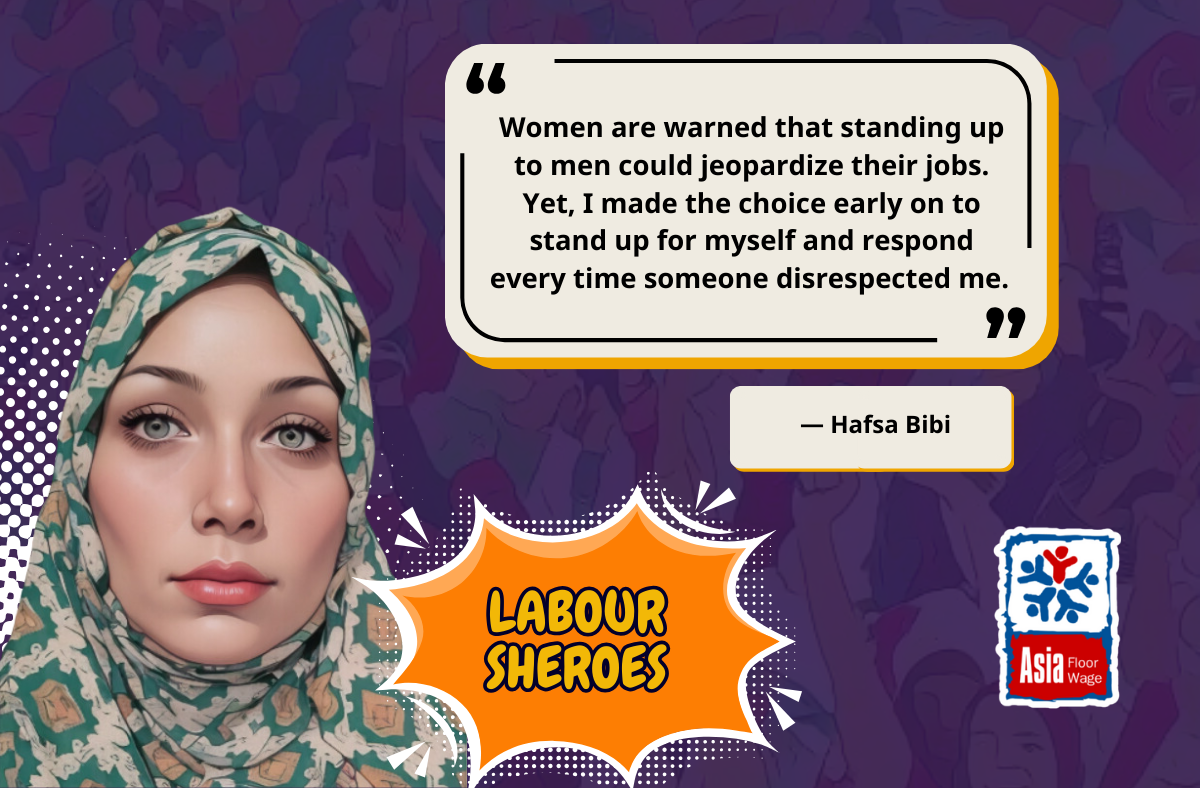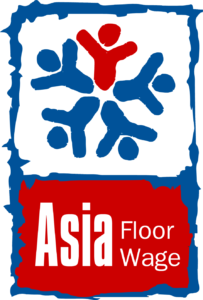Breaking the Silence: Hafsa Bibi’s Stand Against Workplace Harassment
By Hafsa Bibi

Hafsa Bibi’s life has been defined by challenges and resilience. From growing up without a father to fighting workplace harassment and providing for her children as a single mother, Hafsa’s journey reveals how courage and perseverance can transform hardship into strength. This is her story, told in her own words.
–
I lost my father when I was just 3 or 4 years old. At the time, my siblings were all young and couldn’t contribute financially, so my childhood was spent moving between relatives’ homes. Some days we stayed with my paternal uncle, and at other times we were at my maternal uncle’s. My mother, a housewife with no experience in the working world, suddenly became the sole provider for our family. To keep us alive, she began leasing land to manage fruit gardens and sold the fruits at the market.
It was heartbreaking to watch my mother struggle so much to ensure we were safe, fed, and cared for. But her sacrifices came at a cost—my education. I wasn’t able to continue studying beyond secondary school. I don’t really remember my father; I only know his face through photographs. Growing up, my mother and those who cared for me became the most important people in my life.
At 16, I started working to support my mother. My first job was with Pakistan Telecom Ltd., a huge step to earn money and shield my mother from the mistreatment she faced in my brothers’ homes after they got married. One of my brothers’ wives was especially disrespectful, and although my mother didn’t fully understand the context, I couldn’t let her endure it. I found work with the help of a friend, rented a small place, and moved in with my mother so she no longer had to live in such an environment.
A few years later, I met my husband, and we got married. But after just two years, he fell ill and developed harmful addictions, making it impossible for him to provide for the family. I became the sole earner.
Hoping to use my sewing skills, I tried to start stitching clothes from home, but in Faisalabad, there wasn’t much demand for tailoring as most people already knew how to stitch. By then, my children were 4 and 5 years old, and I had no choice but to seek work in the garment sector.
Those initial days were incredibly hard for me. Harassment began the moment I stepped out of my home. Men on the streets stared at me, some made inappropriate remarks, and on public transportation, others deliberately brushed against me. The factory environment wasn’t much better. During my first week, I kept my head down, avoiding eye contact, because I could sense people watching me. It was intimidating, but I forced myself to focus on my work and block out the behavior around me.
Gradually, I realized that if I let others’ actions affect me, it would only make me feel powerless. I told myself that toughening up would help me persevere. This mindset allowed me to navigate the challenges.
My supervisor often assigned me the most difficult tasks, likely assuming I’d struggle. However, since I already knew how to stitch, I completed them with ease. Surprised that I didn’t falter, they continued assigning me even tougher tasks and spent a lot of time standing over me, watching me work. The constant scrutiny was draining, but I kept going.
Unfair treatment is a regular part of being a woman in the garment sector. We often work as hard as the men, but we’re belittled or told to accept misconduct in silence. Women are warned that standing up to men could jeopardize their jobs. Yet, I made the choice early on to stand up for myself and respond every time someone disrespected me.
I believe that how people treat us starts with how we see ourselves. I decided that I would not feel inferior to the men working alongside me, and I started speaking up for myself. If someone insulted or harassed me, I made sure to reply firmly and loudly to show I wasn’t weak.
In our society, it’s common for women who work outside the home to face judgment and criticism. Men, on the other hand, are never questioned. I wanted to set an example for other women, to inspire them to demand respect. Whenever I responded to someone’s inappropriate behavior, I felt I was creating a safer workplace for myself and my colleagues.
At one factory, we had a supervisor who frequently disrespected women, using abusive language and even getting physical. One day, he grabbed a bundle of fabric from me and pushed me. Reacting instinctively, I slapped him, which led to a physical altercation. To defend myself, I picked up a pair of scissors.
The matter was reported to the factory owner. CCTV footage revealed the supervisor had manhandled me, and the owner supported me, firing the supervisor on the spot. That moment restored my faith in justice and gave me a sense of pride.
My greatest achievement is my ability to provide for myself and my children through my work. Raising them entirely on my own fills me with pride. I’ve become independent, self-reliant, and more determined than ever to create a better future for them.
–
Not all encounters are positive. Early in my career, the man at the stitching station next to me often made me uncomfortable, though I chose to ignore him. One day, he approached me and said his wife was seriously ill and asked for a loan for her treatment. I decided to help and promised to give him the money during lunch by going home to retrieve it. He insisted on coming with me, but I refused, knowing how it might look to others. I brought the money back and handed it to him.
A few days later, I learned he was spreading lies about me, insinuating an inappropriate relationship. This betrayal was devastating. I had helped him in good faith, and he had used it to attack my character.
Challenges like these are a reality for many women. It’s crucial to never give up, even when those you trust let you down or others try to undermine you. Women have incredible strength—they just need to recognize it. Speak up for yourself, protect your rights, and don’t let anyone make you feel less capable or valuable. Your resilience is your greatest weapon. Use it wisely, and don’t let anyone take it away from you.
–
Hafsa Bibi is the Vice President of the Textile Power Loom Garment Workers Union. Her story is part of ‘Labour Sheroes,’ an initiative under the 16 Days of Activism campaign by Asia Floor Wage Alliance. Through this series, we share the stories of women garment workers from South and Southeast Asia who are breaking barriers, fighting against workplace violence and harassment, and leading the change for better working conditions in the global garment industry.
